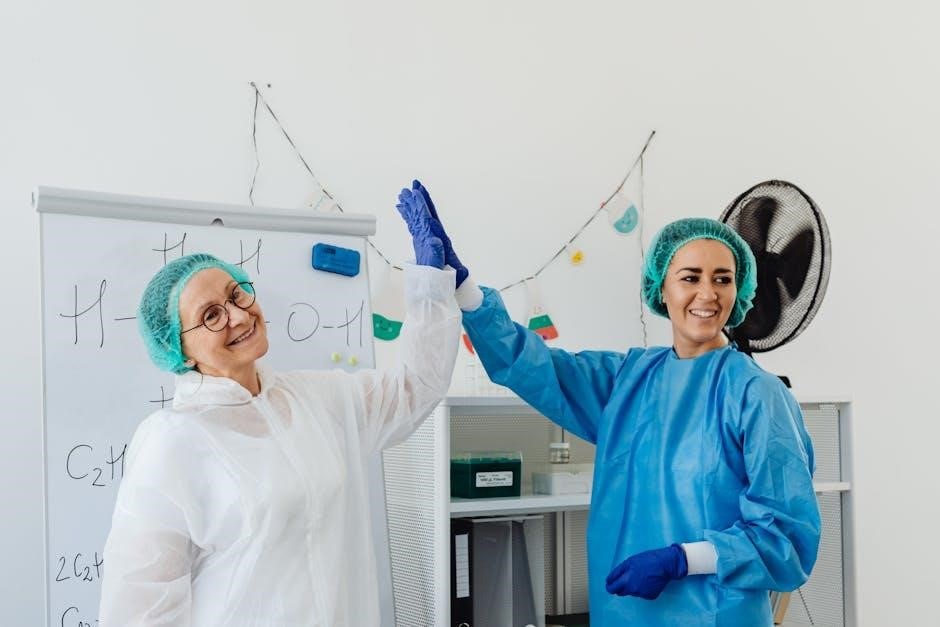Lessons in Chemistry is a captivating series about Elizabeth Zott, a trailblazing female chemist in 1960s Southern California․ Blending drama and inspiration, it offers a powerful story for parents to explore themes of resilience, ambition, and breaking societal barriers, making it a valuable parents guide to fostering curiosity and critical thinking in children․
Overview of the Series
Lessons in Chemistry is a compelling drama series based on Bonnie Garmus’s bestselling novel, following the life of Elizabeth Zott, a brilliant yet unconventional female chemist in 1960s Southern California․ After being fired from her academic job due to gender discrimination, Elizabeth unexpectedly becomes the host of a popular cooking show, where she uses her scientific expertise to teach chemistry through recipes․ The series blends humor, heartbreak, and inspiration, showcasing Elizabeth’s resilience as she challenges societal norms and pursues her passion for science․ With its strong female lead and historical context, the show highlights the struggles faced by women in STEM fields while celebrating their achievements․ It serves as a powerful reminder of the importance of perseverance and breaking barriers, making it a thought-provoking watch for both parents and teenagers․

Themes and Messages for Parents
Lessons in Chemistry explores themes of resilience, gender equality, and the challenges faced by women in STEM fields․ Elizabeth Zott’s journey highlights the importance of perseverance, self-belief, and breaking societal barriers, offering parents a platform to discuss with their children the value of standing up against discrimination and embracing individuality․ The series also emphasizes the power of science as a tool for understanding the world, encouraging curiosity and critical thinking․ Additionally, it touches on single parenthood and the balancing act between career and family, providing insights into the complexities of modern life․ These themes make the series a valuable resource for parents seeking to inspire their children with stories of strength and determination while fostering a deeper appreciation for science and its real-world applications․

Understanding the Content
The series portrays a female chemist’s journey, blending personal and professional challenges, offering insights into resilience, ambition, and societal issues, while highlighting STEM’s impact on everyday life․
Sexual Violence and Mature Themes
Lessons in Chemistry addresses mature themes, including a non-graphic depiction of sexual violence, where a woman is assaulted by a man in a position of power․ This incident is referenced in flashbacks, highlighting its emotional and professional impact on the character․ The series also explores systemic gender bias and workplace discrimination, providing a realistic portrayal of challenges faced by women in STEM fields during the 1960s․ While these themes are handled with care, they may require parental guidance for younger viewers․ The show offers a platform for discussions about consent, power dynamics, and resilience, encouraging parents to address these sensitive topics with their children in an age-appropriate manner․ Understanding the context of these scenes is crucial for fostering meaningful conversations about societal issues and personal boundaries․
STEM Education and Female Representation
Lessons in Chemistry shines a light on the challenges and triumphs of women in STEM fields through the character of Elizabeth Zott, a brilliant chemist․ The series highlights her groundbreaking work and unconventional teaching methods, which inspire her students to think critically and embrace scientific curiosity․ Elizabeth’s journey underscores the systemic gender biases women faced in mid-20th-century STEM careers, offering a powerful narrative about perseverance and innovation․ The show not only celebrates scientific discovery but also emphasizes the importance of female representation in male-dominated fields․ Parents can use this series to spark conversations about equality, ambition, and the value of STEM education․ It also serves as a motivational tool for encouraging girls to explore science and mathematics, showing how women can break barriers and achieve greatness in their chosen fields․ This makes it a valuable resource for fostering STEM interest and gender equality discussions․

Talking to Your Child
Encourage open conversations with your child about Lessons in Chemistry․ Discuss Elizabeth’s journey, fostering curiosity and resilience․ Guide them through sensitive themes, helping them reflect on the show’s messages․ Keep it supportive and engaging, exactly ․
Encouraging Scientific Curiosity
Lessons in Chemistry offers a unique opportunity to inspire your child’s interest in science․ Elizabeth Zott’s journey as a chemist and TV personality showcases how science can be both fascinating and accessible․ Encourage your child to ask questions about the scientific concepts presented in the series, such as chemistry experiments or the importance of STEM education․ Discuss how science applies to everyday life, from cooking to problem-solving․ Foster a sense of curiosity by engaging in simple science activities at home, like mixing baking soda and vinegar or growing plants․ These hands-on experiences can help your child develop a deeper appreciation for science and its role in the world․ Use the show as a springboard to explore STEM topics together, highlighting how perseverance and creativity are essential in scientific discovery․ By connecting the series to real-world applications, you can nurture your child’s scientific curiosity and love for learning․ Always keep conversations engaging and supportive․
Addressing Sensitive Topics
Lessons in Chemistry tackles mature themes, including sexual violence and gender discrimination, which are essential for parents to discuss with their children․ The series portrays these issues thoughtfully, providing opportunities for open conversations about consent, power dynamics, and resilience․ It’s important to approach these topics with empathy and honesty, helping your child understand the historical context and the impact of such experiences on individuals․ Use the series as a tool to teach your child about respect, boundaries, and the importance of standing up against injustice․ Encourage them to ask questions and share their feelings, fostering a safe and supportive environment for dialogue․ By addressing these sensitive topics together, you can help your child develop a deeper understanding of the world and its complexities․ This can also strengthen your bond and equip them with the emotional tools to navigate challenging situations․

Additional Resources
Explore books like The Rose Code and STEM-focused guides to deepen your child’s understanding of science and resilience․ These resources complement Lessons in Chemistry’s themes and encourage further exploration․
Books and Media for Further Exploration
Lessons in Chemistry inspires further learning and discussion․ For books, consider The Rose Code, which explores women in STEM roles, or The Maid, offering thought-provoking themes for book clubs․ Media-wise, shows like Hidden Figures highlight women breaking barriers in science․ STEM-focused guides, such as The Parents Guide to STEM, provide practical tools to support your child’s curiosity․ These resources align with the series’ themes of resilience, ambition, and scientific exploration, fostering a deeper understanding of the challenges faced by women in male-dominated fields․ Use these recommendations to encourage critical thinking and a love for learning in your child, helping them navigate their own path of discovery and growth․
Guides for Supporting STEM Learning
Guides like The Parents Guide to STEM offer practical strategies to nurture your child’s interest in science, technology, engineering, and math․ These resources emphasize fostering curiosity and resilience, aligning with the themes in Lessons in Chemistry․ Encourage hands-on experiments, ask open-ended questions, and celebrate failures as learning opportunities․ Provide access to STEM-related books, documentaries, and online courses to deepen their understanding․ By creating a supportive environment, you help your child build confidence and a passion for problem-solving․ These guides also highlight the importance of representation, showing how women like Elizabeth Zott paved the way in male-dominated fields․ Use these tools to inspire your child to embrace STEM with enthusiasm and determination, helping them navigate their educational journey with confidence and curiosity․
